Following a design path not unlike many other products catering to perceived demands for increased amenities and comfort, Triumph has enlarged the waistline of its Sprint 1050cc Triple for 2011.
The formerly designated Sprint ST (Sport Tourer) has now evolved into the 2011 Sprint GT (Grand Tourer). In becoming so, it delivers more cargo room and a plusher ride, while not losing much of its edge as a respectable canyon carver with bags.
The newly aggrandized model achieves its status in part by a 3.2-inch longer wheelbase (60.5-inches compared to a previous 57.3 inches), while offering updated styling to modernize the ST’s five-year-old design. The penalty for the new Sprint’s stretching and aesthetic sharpening is an additional 60 lbs – a more than 10% curb weight increase over its predecessor, now at 591 lbs full of fuel.
Overview
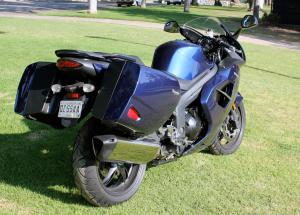 The new rear view of the Sprint includes a single exhaust in place of the triple trumpet found on the previous ST version. The new rear view of the Sprint includes a single exhaust in place of the triple trumpet found on the previous ST version. |
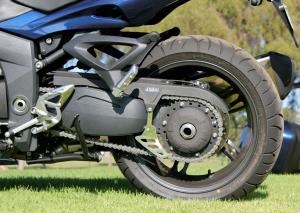 Tidy details abound. The black-finished cast bits, and polished pieces complement the single-sided swingarm. The ignition key detaches the one-piece saddle. Tidy details abound. The black-finished cast bits, and polished pieces complement the single-sided swingarm. The ignition key detaches the one-piece saddle. |
Triumph says it has tipped the balance more toward “touring” in the sport-touring equation. Although we’re not overawed by the extra bulk with only some extra muscle to push it, we’ll still say that the bike works very well as the sporting tourer it’s intended to be, and we really like it.
Improvements include a stainless steel side-mounted muffler, instead of the signature three-pipe underseat exhaust that, while stylish, caught criticism by some for cooking the rider.
The GT’s wide, mildly stepped saddle provides all-day comfort and accommodates a variety of riders, although its claimed 32.1-inch height is pessimistic. “My inseam measures about 32 inches,” says Duke, “and there’s no way I can flat-foot the Sprint at a stop.” Coupled with a sufficiently broad and well-finished fairing, this still-potent bike is a mile eater.
A Sprint rider has a greater reach for the bars than its larger sport-touring rivals like the Yamaha FJR1300 and Kawi Concours 14, but ergos are nonetheless reasonably upright. The relatively tall seat height allows a comfortable amount of legroom despite the moderately rear-set, rubber-topped footpegs.
The alloy perimeter frame – tastefully finished in black and accenting nicely against black wheels and other black pieces – rides rock steady, and is coupled with a conventional Showa 43mm cartridge fork. Canted at a steep 23.5-degree rake and providing 84mm trail, the preload-adjustable fork has dual-rate springs, and, while simple, it is effective.
Out back is a monoshock that’s easily adjusted for preload by a large, right-side-mounted knob. The overall ride is quite plush on the freeway, and the fairing effectively deflects wind to shoulder height.
The single-sided cast alloy swingarm with eccentric chain adjuster, plus other castings, machined bits, hardware, and overall fit and finish are a pleasing sight to those who appreciate attention to detail.
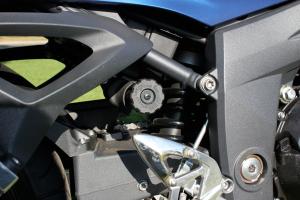 This knob adjusts the rear spring preload. This knob adjusts the rear spring preload. |
Front Nissin four-pot calipers clamping 320mm rotors, and matching dual-piston rear caliper putting the squeeze to a 255mm rotor, are strong and reliable. Braided brake lines provide good feedback. The anti-lock system has a fairly high threshold up front, but intervention comes up easily from the rear.
One nitpick in this department is the rather long reach to the front brake lever. Both the front brake and clutch lever are adjustable to four positions, but there is a significant disparity in reach between the two. Even large hands have a longish reach to the brake lever when set to the shortest position.
Less easy to criticize, but also not utopian, is the 5.3-gallon fuel tank. Triumph claims about 200 miles per tank-full. Our testing confirmed this could be possible, but aggressive solo riding will tip this to closer to 170 miles or less. This is not so bad, and a lot of riders will be satisfied with this. Even so, we’d have liked to have seen a 6-gallon tank on a bike with this long-legged two-up potential. However with its curb weight already knocking on the back door of 600 lbs, and perhaps other design considerations, the fuel capacity is what it is.
Another issue we’d observe is with the headlights. The Sprint ST was known to have only so-so illumination. Triumph says the Sprint GT’s halogens replacing the projector setup on the previous model are better, and we agree. However, they are only okay. The twin low beams on either side leave dim spots in the beam pattern, and have only adequate peripheral coverage (for cornering or to spot animals crossing the road, etc.). The cycloptic center-mounted high beam gives good illumination of trees and overhead signs on the highway, but does little to fill in the voids left by the low beams or add to the side view. We think one high-beam bulb for two low beams is inadequate for a high-speed tourer, and believe more lighting might have been had by better engineered use of reflector space and other lighting technology now available.
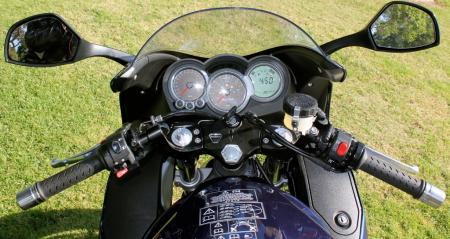 Cockpit view: Instruments are functional. Polished handlebar weights roll freely when twisted. Hitting the red right-side kill button shuts off the electricity to the instruments but leaves headlights on. Note lockable right side compartment in fairing. Very handy. Cockpit view: Instruments are functional. Polished handlebar weights roll freely when twisted. Hitting the red right-side kill button shuts off the electricity to the instruments but leaves headlights on. Note lockable right side compartment in fairing. Very handy. |
If purchasing this bike – and by no means are we saying we would still not recommend it – we’d nevertheless factor in an auxiliary headlight arrangement to put the finishing touches on this bike’s after-hours back-road potential.
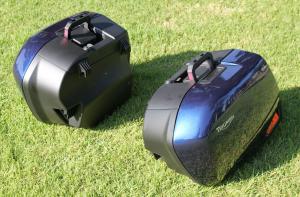 Large 31 L: (8.2 gallon) saddlebags detach and attach easily. Large 31 L: (8.2 gallon) saddlebags detach and attach easily. |
Additional very minor complaints would be for an LCD bar graph-style fuel gauge that’s slow to register after a fill-up. Also, our bike would stall when coming to a stop while the engine was still warming.
Speaking of instrument functions, the trip computer on the GT complements the normal data readout one would expect with additional features travelers might want to know. These include clock, instantaneous fuel consumption, average fuel consumption, range, trip distance, average and maximum speed.
The icing on the new, larger Sprint GT cake comes from well-designed panniers featuring a rather generous 8.2-gallon capacity, and a max laden weight of 16.5 lbs per bag. They are easy to open and close, remove and install, and they lock with the ignition key. Closing with a deep lip into a rubber gasket, they are tight, and hosing them down with a direct blast of water at the seam verified their water resistance.
On the Road
You’ve heard the extent of the gripes up front. No issue was enough to really raise much of an eyebrow, and at this point, we have mostly praise for this unique motorcycle.
Most noticeable is a grunty motor that lets the machine pull away from a stop with poise and ease. Although the power-to-weight ratio is down from the ST, the engine still has enough torque to loft the wheel in first gear with a snap of the throttle or a little clutch slip.
At low-to-moderate speeds the exhaust note grows from burbly to authoritative. On the boil, the Triple’s wailing soundtrack is agreeable, although some of the good vibes felt include those transmitted from the revving engine. This resonance can be perceived through the tank when resting against it. It’s buzzier than the velvety but approximately $5,000-more-as-equipped Honda VFR1200F, for example, but only when revs are higher than normal cruising speeds.
As for its handling manners, the Triumph leaves little to be desired. Turn in response is suitably quick at any speed, and the GT proves to be much more agile than any of its 1300cc-plus competitors. The Sprint’s aggressive chassis geometry – coupled with the 10mm narrower than some rear tire – encourages riders to whip this 600-pounder around like they stole it, and implicitly coaxes them to try to go deeper and deeper. Cornering grip from the Bridgestone BT-021 ZR-rated Sport Touring tires (120/20-17 front, 180/55-17 rear) is enough to scuff the peg feelers on good pavement at a brisk pace.
Most refreshing of all is the Sprint GT’s chain drive.
For those of us still biased toward the “sport” side of the sport-touring equation, we find this to be a terrific asset on a bike like this, and not much of a liability as some shaft-drive advocates might purport. Since it comes with a centerstand, a long-distance rider can easily lube the high-quality DID X-ring chain as needed. If it actually stretches on your circumnavigation of North America, then get out the tools and adjust it.
For aggressive riders, chain maintenance is worth the effort compared to the dynamic compromises inherent in a shaft-drive system. In our view, the Sprint out viffs the Honda VFR in this performance category.
Honda says its new Viffer was created to satisfy long-time sportriders, and it designed an offset shaft drive said to let the VFR accelerate and handle practically the same as a chain-driven bike, but aggressive riders still notice the shaft on the VFR. Between the two, the Sprint GT delivers power more “like a chain” because, indeed, it has one.
On the highway, the Sprint GT is every bit as unflappable as the ST ever was. Here its longer wheelbase and extra heft are purely assets. With its suspension set stiff, expansion joints might still jostle the rider, but not so much, and this motorcycle, with its larger-than-sportbike fairing, otherwise feels like an airplane on two wheels.
We were often surprised to see how fast we were really going when it felt so sedate and often had to back off the throttle. This is a bike that likes to get up to 90 mph in half the time it takes you to read this sentence. This range seems to be about its ideal cruising speed. Of course 55-75 mph is no problem to maintain either, but if you want to know, these are the facts.
In the interest of science and two-wheeled felicity, we can also report that the 10,000 rpm-redlined GT will pull hard well over 100 mph, but not as freely as a Japanese liter-size repli-racer when set to warp drive. This is probably a good thing since a bike like this could get you on the wrong side of the law easily and you wouldn’t want it to aid and abet you toward that any more than it already does.
Conclusion
The Sprint GT is a bike we could live with day in and day out, and would make a great commuter, grocery-getter, weekend bike, and will accommodate two-up riding very well.
We expect Triumph will continue to attract new fans with this $13,199 machine because with chain drive, panniers, ABS, and a centerstand included, it remains with no direct competitors.
We did not test it with the optional top box that’s supposed to hold two full-face helmets, but can tell you it comes as three parts, including the $479.99 box itself, a $129.99 painted lid, and $129.99 sliding rack, for a total of $739.97.
Our bike’s deep blue hue is very tasteful to our eye, and this new age Brit bike has a great degree of character, not lost on passers by.
Coming to a stop light, I waited as a grizzled, long-haired, white-bearded fellow, walked past with a cane. As he caught my eye, he held it, and drawing closer, he commented, “Trumpet eh?” as he continued to amble by. “Yes it is! It’s a 2011,” I replied brightly, assuming he’d been a rider long before. “That’s a nice looking scooter,” he said, as he continued toward the other side.
Fact is, it’s a nice performing scooter, too, and after riding it hard and putting it away wet, we think this gentleman’s spur-of-the moment summation is just about spot on.



 9:53 PM
9:53 PM
 Unknown
Unknown


 Posted in:
Posted in: 




0 comments:
Post a Comment